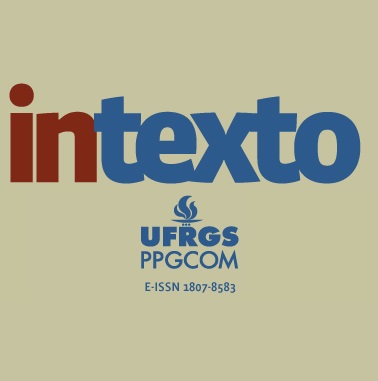The media representations of transexuality in telenovela A força do querer
DOI:
https://doi.org/10.19132/1807-8583202049.214-232Keywords:
Transsexuality. Representation. Queer Studies. Telenovela.Abstract
This article reflects on the representation that the soap opera A força do querer of Rede Globo built on transsexuality through the character Ivana/Ivan. The analysis of the work is based on the analytical instrument of the Culture Circuit, a theoretical and methodological contribution of Cultural Studies (DU GAY et al., 1997), which comprises five distinct processes - representation, identity, production, consumption and regulation - as responsible for producing meanings in society. They are differentiated processes that are articulated in the construction of meanings. In this article, we present the content worked on the Representation axis, with the theoretical support of the queer studies of Judith Butler. The study concludes that the telenovela had an intention to promote a discourse in favor of diversity, demystifying essentialist conceptions and pointing to the new possibilities of generalized identities, brought to the surface from the experience of transsexuality. Nevertheless, the telenovela constructed a transsexual subject according to the parameters of the medical discourse and, in this way, its representation establishes a truth about the transsexuality, that confines the transsexual identity to the rigid standards of what it is to be transsexual, leaving aside the diversities and the pluralities that exist in each experience.
Downloads
References
BENTO, Berenice. O que é Transexualidade. São Paulo: Brasiliense, 2008.
BUTLER, Judith. Problemas de Gênero: feminismo e subversão da identidade. Rio de Janeiro: Civilização Brasileira, 2003.
DOURADO, Jacqueline Lima. Rede Globo: mercado ou cidadania? Teresina: EDUFPI, 2011.
DU GAY, Paul et al. Doing Cultural Studies: the story of the Sony Walkman. Londres: Sage, 1997.
FINAL de ‘A Força do Querer’ bate os 50 pontos de audiência. Veja, São Paulo, 23 out. 2017. Disponível em: http://veja.abril.com.br/entretenimento/final-de-a-forca-do-querer-bate-os-50-pontos-de-audiencia/. Acesso em: 30 out. 2017.
GOMES, Juliana Oliveira. Arebaba! Telenovela e autoria. Caminho das Índias, Glória Perez e os relatos de migrantes e viajantes. 2013. Dissertação (Mestrado em Comunicação e Culturas Contemporâneas) – Faculdade de Comunicação, Universidade Federal da Bahia, Salvador, 2013.
HALL, Stuart. Quem precisa da identidade. SILVA, Tomaz Tadeu. A produção social da identidade e da diferença. In: SILVA, Tomaz Tadeu (org.). Identidade e diferença: a perspectiva dos estudos culturais. 15. ed. Petrópolis: Vozes, 2014. p. 103-133.
HALL, Stuart. The work of representation. In: HALL, Stuart (dit.). Representation. Cultural representation and cultural signifying practices. London: Sage, 1997. p. 13-74.
LOPES, Maria Immacolata Vassallo de. Telenovela brasileira: uma narrativa sobre a nação. Comunicação e Educação, São Paulo, v. 26, p. 17-34, jan./abr. 2003.
LOURO, Guacira Lopes. Um corpo estranho: ensaios sobre sexualidade e teoria queer. 2. ed. Belo Horizonte: Autêntica, 2016.
SALIH, Sara. Judith Butler e a Teoria Queer. 1. ed. Belo Horizonte: Autêntica, 2017.
SILVA, Tomaz Tadeu. A produção social da identidade e da diferença. In: SILVA, Tomaz Tadeu (org.). Identidade e diferença: a perspectiva dos estudos culturais. 15. ed. Petrópolis: Vozes, 2014. p. 73-102.
WOODWARD, Kathryn. Identidade e diferença: uma introdução teórica e conceitual. In: SILVA, Tomaz Tadeu (org.). Identidade e diferença: a perspectiva dos estudos culturais. 15. ed. Petrópolis: Vozes, 2014. p. 7-72.
Downloads
Published
How to Cite
Issue
Section
License
Copyright (c) 2020 Intexto

This work is licensed under a Creative Commons Attribution-NonCommercial 4.0 International License.
The copyright of works published in this journal belong to the authors, and the right of first publication is conceded to the journal. Due to the journal being of open access, the articles are of free use in research, educational and non-commercial activities.
Therefore, the journal uses the License Creative Commons Attribution (CC BY-NC 4.0), which allows sharing of work with acknowledgment of authorship.
Self-archiving (repository policy): authors are allowed to deposit all versions of their work in institutional or thematic repositories without embargo. It is requested, whenever possible, that the full bibliographic reference of the version published in Intexto (including the DOI link) be added to the archived text.
Intexto does not charge any article processing fees (article processing charge).















